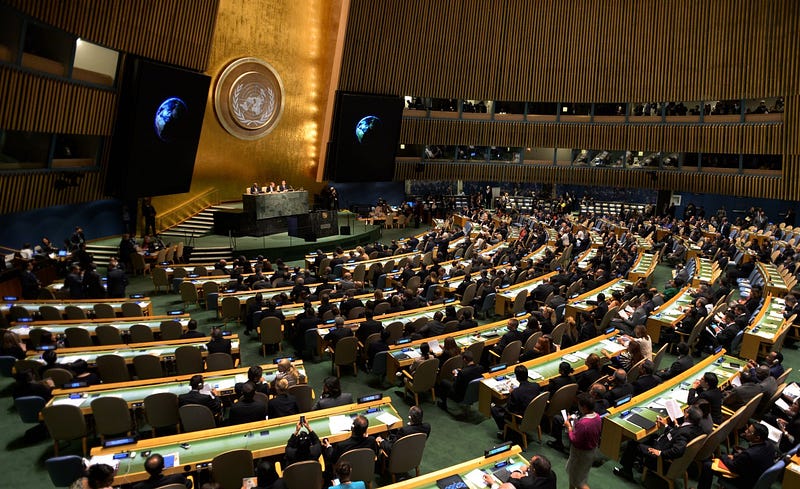
Photo Courtesy of WBUR
At the end of September, leaders of nations from all around the world convened in New York City for a two-week long conference organized by the UN. The purpose of these negotiations was to establish government measures to protect the high seas and preserve its biodiversity before irreparable damage is done.
Four members of the Hamilton community were able to observe portions of the negotiations: Assistant Professor of Environmental Studies Aaron Strong, Nick Jickling ’19, Amarilys Milian ’20, and Jack Wright ’19.
In describing the actual process of negotiating these agreements, Professor Strong explained, “The UN makes decisions on the basis of consensus. They try to have every country get on board with the text of the treaty without anyone disagreeing. This often leads to a least common denominator form of compromise, and that was definitely the case at this meeting. In addition, the axes of disagreement have already long been established between conservation-oriented and NGO-aligned small island Pacific states and major fishing countries like Russia, Iceland, China and others and all of those disagreements were on display at the meeting. What impressed me was that the dominant and more numerous voices in the room were the conservation-minded ones. That doesn’t always happen.”
Wright was surprised by some of the events at the negotiations, saying, “One thing that was really exciting about this opportunity was that we knew what we were getting into at the start, but weren’t sure if the chair of the convention would decide to extend the negotiations into the weekend (we arrived on Thursday night to see the Friday and possibly Saturday debates). They actually came to a conclusion on Friday and didn’t continue negotiations on Saturday. When we broke for lunch on Friday, we had no idea what the outcome would be. It was pretty amazing to think that in that one hour’s time, the chair of the conference was meeting with the countries that were pushing back (Russia, USA, China, Japan, Iceland) to find some sort of compromise that would influence how we protect the high seas for years to come.”
Both Strong and Wright stressed the importance and value of this experience. When asked about how it felt to be physically present for such a landmark moment in international environmental policy, Strong said, “For my own scholarship in this arena, which focuses on how climate science informs international ocean governance, being in the room is essential to describing the fullness of the governance process.”
“Reports, minutes, and web streams are all useful, but nothing beats being in the room. They show the process for what it is: a process of a few hundred human beings sitting in one room together discussing the future approach to managing nearly half of the planet that lies beyond national boundaries. The students now understand this process and can share it with others (as they did recently at a debriefing session). None of that learning happens without being in the room.”
Wright agreed, adding that seeing the negotiations occur live not only enhanced his academic experience as an environmental studies and public policy double major, but also framed his classes in a real-world perspective. “It was really cool to see some of the topics from class come alive at the convention. I’m taking an environmental justice course right now and I think that made me very aware of equity and the roles of the countries represented at the convention. For example, many of the Pacific Island nations relied on NGO or UN funding to send their delegates to this convention. It’s pretty shocking when you think of the millions of people that are not involved in these global decisions simply because their country can’t afford to send delegates. It definitely makes some of my courses
seem more real and less academic.” While the issue being addressed is very serious, Wright also noted that the jokes exchanged among the delegates added to the experience, and certainly would have been missed in the transcript. “One thing that surprised me was the mix of very formal convention proceedings and super informal jokes from participants. There seemed to be a competition between the countries to see who could make the best ocean/sea/boat-related pun, which certainly made it more interesting. The conference chair was also sharing stories about NCIS and making jokes about ‘hammer time’ which took me a bit surprise! I guess bureaucrats have a sense of humor too.”
The consensus among the four was that attending the UN negotiations was a valuable learning experience, and one that they are very hopeful to return to in the future. Said Strong: “In addition to the students who just went this fall and want to go back, I already know of a few more students who are interested in attending those future sessions. For the students who attended this fall’s session, they really can’t wait to see what happens this coming March. The biggest thing I would change in the future is to go for a longer period of time! We were only there for two days, and we were there right when the session was wrapping up. That was cool because we had a real sense of the debate at the end, but I think we all agreed that next time it’s worth going for much longer!”
